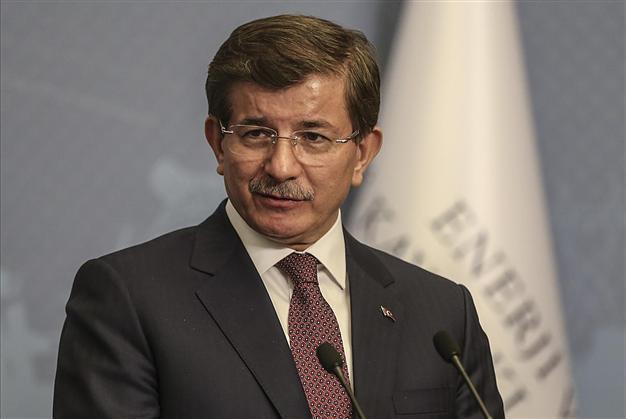Kurdish peace viable within a few months, Turkish PM says
ANKARA

Turkish Prime Minister Ahmet Davutoğlu. AA Photo
The Turkish government and the Kurdish political movement have sounded a note of optimism for the future of the stalled peace process, with Prime Minister Ahmet Davutoğlu suggesting that the process could reach a settlement within the next few months if all actors involved fulfill their roles.“Now there is a road map that we have designated. If all of the parties, particularly the segments that are involved in the resolution process, do their part, then the desired point can be reached in the shortest time, within the next few months,” Davutoğlu said in an interview aired on Al-Jazeera late on Oct. 22.
A leading deputy of the Peoples’ Democratic Party (HDP) echoed Davutoğlu’s optimism, saying five or six months could be enough to complete the process, including disarmament by the outlawed Kurdistan Workers’ Party (PKK).
“Including disarmament, five-six months would be enough for us to reach an absolute peace. That’s to say, we would leave all these things behind when March arrives,” Önder said, speaking in an interview with CNN Türk on Oct. 22.
Still, both outlined their party’s essential priorities for such striking progress in the process, which aims to end a bitter three-decade-old conflict between the PKK and Turkey’s security forces that has claimed almost 40,000 lives over more than three decades.
While Davutoğlu underlined the need for mutual steps and stressed that the ruling Justice and Development Party (AKP) should not be expected to unilaterally advance the process, Önder, whose party is a key player in the Kurdish political movement represented in Parliament and is directly involved in the process, stressed the urgency of improving jailed PKK leader Abdullah Öcalan’s living conditions.
“Our stance is open and clear. We have taken the required steps and we are determined to take more. But of course these kinds of processes don’t work unilaterally,” Davutoğlu said.
“There is a particular need for everybody’s agreement on the preservation of public order and stability in Turkey and this process should be run step by step. If the developments in Iraq and Syria didn’t happen, we had the conviction that we could have completed this in a shorter time. However, the developments in Syria and Iraq, particularly the latest incidents, led to some troubles in regards to steps that would be taken inside Turkey,” he added, in an unveiled reference to violent demonstrations that dealt a severe blow to the shaky peace process two weeks ago when upward of 43 people died in the worst unrest in Turkey’s southeast in years.
For his part, Önder, who is a frequent visitor to Öcalan as part of the peace process along with the HDP’s deputy parliamentary group chairs, İdris Baluken and Pervin Buldan, cautioned that an improvement in the living conditions of Öcalan, a central player in the process, is a “must.”
“His conditions have not changed. We have held more than 20 meetings and we held all of them in the same place. He is staying in a place that is at most 15 square meters in area,” said Önder.
“It must change. A person is trying to build peace and he is doing this despite all of these limited conditions,” he added when asked whether he thought there would be a change in Öcalan’s conditions.
Meanwhile, HDP leader Selahattin Demirtaş refuted reports suggesting that the government had shared a road map for the process with them.
“Four days ago, an index of the road map was given to us and we shared this with Kandil. Öcalan wanted someone from Kandil to participate in the negotiation delegation,” Demirtaş said in an interview published in daily Cumhuriyet yesterday, referring to the Kandil Mountains, where other PKK leaders are headquartered.
















